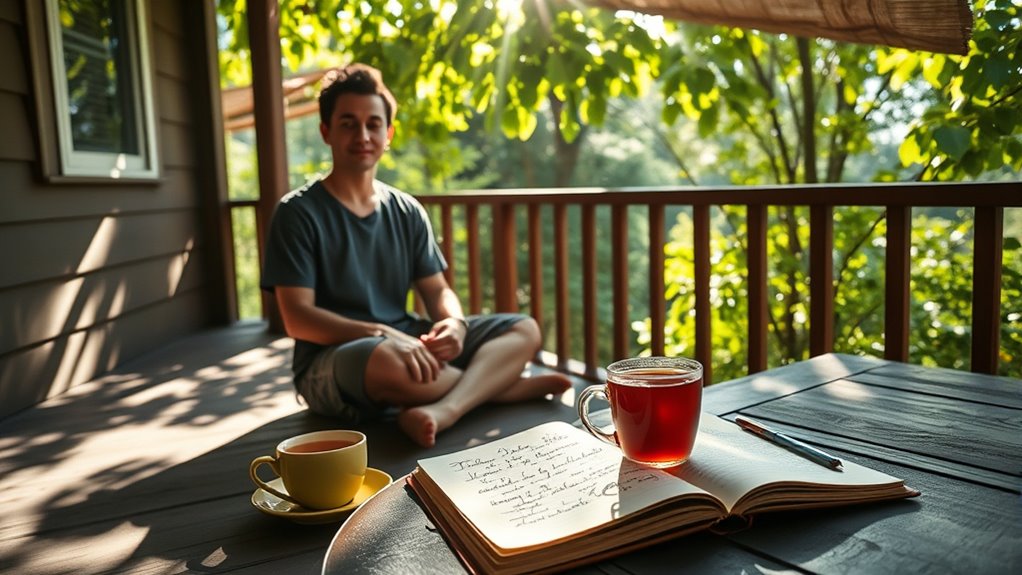To incorporate mindfulness into daily life, start with simple steps like dedicating a few minutes each morning or evening to focus on your breath or observe sensations in your body. Practice mindfulness during routine activities like eating, washing dishes, or commuting to deepen your awareness. Consistency helps develop habits that soften reactions and promote calmness. By making small, intentional efforts, you can considerably boost your presence and well-being—continue to explore how these habits transform your daily experience.
Key Takeaways
- Dedicate a few minutes daily to meditation focusing on your breath or bodily sensations.
- Practice mindful awareness during routine activities like eating or walking to anchor yourself in the present.
- Use deep breathing techniques to manage stress and create mental space during overwhelming moments.
- Establish consistent habits to integrate mindfulness seamlessly into your daily schedule.
- Recognize that even brief, intentional pauses promote ongoing mental clarity and emotional resilience.

Practicing mindfulness daily can substantially enhance your overall well-being. When you make a conscious effort to stay present, you start noticing how often your mind drifts into worries about the future or regrets about the past. Incorporating simple mindfulness practices into your routine can help you regain focus and clarity. One effective way to do this is by exploring meditation techniques designed to anchor you in the present moment. Whether it’s focusing on your breath, observing sensations in your body, or visualizing peaceful scenes, meditation techniques serve as powerful tools to cultivate awareness and calm your mind. These exercises don’t need to be lengthy; even a few minutes can make a significant difference. Over time, consistent practice strengthens your ability to stay mindful amid daily distractions.
Mindfulness isn’t just about relaxation; it’s also a practical approach to managing stress. Using stress reduction strategies, you can transform moments of tension into opportunities for grounding yourself. When you feel overwhelmed, pause and take a few deep breaths, paying close attention to each inhale and exhale. This simple act helps slow your heart rate and clears your mind, making it easier to respond thoughtfully rather than react impulsively. Incorporate other stress reduction strategies, such as progressive muscle relaxation or mindful walking, to diversify your approach. By actively engaging in these techniques, you create a mental space where stress loses its grip, allowing you to approach challenges with greater resilience.
Integrating mindfulness into your daily routine doesn’t require drastic changes. You can start by setting aside a few minutes each morning or evening to practice meditation techniques, or by intentionally bringing your attention to everyday activities like eating, washing dishes, or commuting. The key is consistency—regularly tuning into the present moment helps develop a habit that gradually becomes second nature. As you become more mindful, you’ll notice that your reactions soften, and you respond more thoughtfully to life’s ups and downs. This heightened awareness not only reduces stress but also deepens your appreciation for simple moments, fostering a sense of peace that extends beyond your meditation cushion or mindfulness app.
Ultimately, mindfulness in daily life is about making a conscious choice to be present. By actively integrating meditation techniques and stress reduction strategies into your routine, you empower yourself to navigate life with greater ease and clarity. Over time, these small, intentional steps can lead to profound improvements in your mental health, relationships, and overall happiness. Remember, mindfulness isn’t a destination but a continuous journey—one that enriches every moment you choose to be fully present.
Frequently Asked Questions
How Can Mindfulness Improve Relationships?
Mindfulness can substantially improve your relationships by strengthening emotional connection and fostering empathy. When you practice active listening with full presence, you genuinely understand others’ feelings and perspectives. This attentiveness builds trust and reduces misunderstandings. By staying mindful, you become more patient and compassionate, creating a supportive environment where relationships thrive. Ultimately, mindfulness helps you connect on a deeper level, making your interactions more meaningful and fulfilling.
What Are Common Barriers to Practicing Mindfulness Daily?
You might find distraction management and time constraints are common barriers to practicing mindfulness daily. Distractions like constant notifications or noisy environments make it hard to stay present. Additionally, your busy schedule can leave little time for mindfulness exercises. To overcome these barriers, try setting aside a few minutes each day, turning off distractions, and creating a quiet space. Consistency helps build mindfulness habits despite these challenges.
How Long Should I Practice Mindfulness Each Day?
Think of mindfulness as a garden that needs daily tending; even five minutes can make a difference. For duration guidance, start with 5 to 10 minutes each day, gradually increasing as you feel comfortable. Consistency is key—your daily commitment transforms moments into lasting change. Remember, quality matters more than quantity, so focus on being fully present during your practice rather than how long you do it.
Can Mindfulness Help With Chronic Stress or Anxiety?
Yes, mindfulness can help you manage chronic stress and anxiety by promoting stress reduction and building emotional resilience. When you practice mindfulness regularly, you become more aware of your thoughts and feelings without judgment, which helps you respond calmly instead of reacting impulsively. This ongoing awareness strengthens your ability to handle stressful situations, reduces anxiety, and fosters a sense of calm and balance in your daily life.
What Are Simple Tools or Apps to Start Mindfulness Practice?
Think of meditation apps as your personal compass guiding you through calm seas. You can start with simple tools like Calm or Headspace, which offer guided meditation and breathing exercises. These apps act as gentle anchors, helping you stay present amid life’s waves. Just open one, breathe deeply, and let the soothing voices lead you into mindfulness, turning everyday moments into a peaceful harbor for your mind.
Conclusion
By incorporating these simple mindfulness steps into your daily routine, you’ll find yourself more present and centered—no need for a time machine, just your mindful awareness. Remember, even the busiest days can be transformed with a moment of pause. So, take a deep breath, embrace the now, and let mindfulness guide you through each day’s adventures. As the ancient Stoics might say, “The present moment is all we truly possess”—so cherish it like a precious artifact.











